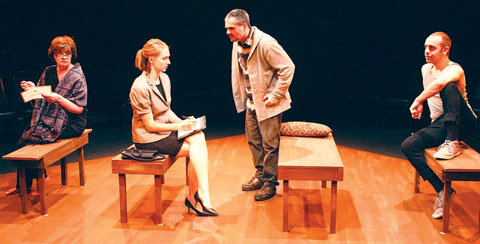
FANCY FOOTWORK The cast handles the difficulties of Tony Kushner’s work — his slides between naturalism and surrealism — with aplomb. |
The fall season has begun with a lot of starry events. The American Repertory Theatre is reinventing Porgy and Bess while the Huntington Theatre Company is doing likewise with Candide. And John Malkovich and Laurie Anderson have been in town thanks to ArtsEmerson.But damned if the most artistically satisfying production I've seen this fall isn't being staged by the Zeitgeist Stage Company at the Boston Center for the Arts's Plaza Black Box (through October 22) — Tiny Kushner, five shorter plays by Tony Kushner. Of course, given that the playwright is one of the two greatest living theater practitioners in America (hi there, Edward Albee) it's no surprise.
Give Zeitgeist and director David Miller credit. Most of Boston's theaters avoid Kushner like the plague, particularly the Huntington and the A.R.T. Miller, by contrast, is totally in sync with Kushner's prose, poetry, and politics, and so are his four actors, who are required to be alternately optimistic and depressive, kind and cruel. Craig Houk and Victor Shopov are more relaxed in their roles than Maureen Adduci and Kara Manson, but they all handle the difficulties of Kushner's slides between naturalism and surrealism smartly and charismatically.
Asked to participate in the annual New York Times Magazine "The Lives They Lived" feature on those who died in 2002, Kushner imagined Lucia Pamela, an American bizarro musician, meeting Queen Geraldine of Albania on the moon. The playlet that resulted was Flip Flop Fly! The previous year his contribution had Richard Nixon's psychotherapist being analyzed in the afterlife, Dr. Arnold A. Hutschnecker in Paradise. Both are never anything less than knowingly amusing contemplations on the American way of life, even in death. As the queen pours out her miseries, Pamela gets the idea to stage her story as a musical, à la Evita. Always look on the bright side.
That same sense of serious fun pervades Terminating orSonnet LXXV . . . (Titles longa, plays brevis. The whole show is about 2 1/2 hours.) This was perhaps the only memorable part of the omnibus production Love's Fire, in which a number of playwrights transmogrified Shakespeare's sonnets. Here, the poem of approach/avoidance ("So are you to my thoughts as food to life") becomes a delicious therapy session between a gay man and lesbian therapist. As in all his Kushner's work, the wordplay is its own reward.
East Coast Ode to Howard Jarvis, A little teleplay in tiny monologues, about a 1996 scheme of New York workers to evade taxes, is like Anna Deavere Smith on Dexedrine, though it has an authorial point of view — it ends with Bill Clinton joining the Republican panderers in ending the era of big government.
But the piece that puts Tiny Kushner in a class with his longer plays is Only We Who Guard the Mystery Shall Be Unhappy. Kushner got the idea from Laura Bush stating that she loved Dostoevsky's The Brothers Karamazov. How does one square the deeply spiritual "Grand Inquistor" segment with her defense of the Iraq war? The answer isn't as ideological as you might think. The former first lady is presented not as a stick figure, but as someone who is tortured by the death of Iraqi children (she is explaining the book to three of the dead children) while resolute in backing her husband.
Kushner is, of course, on the other side of the debate, and I can't imagine there are many Republicans out there who would find Tiny Kushner palatable. Their loss. Kushner's humanism is too artful and thought out to be dismissed. In this production, it's embraced by Miller and his actors. It's a group hug we could all use these days.